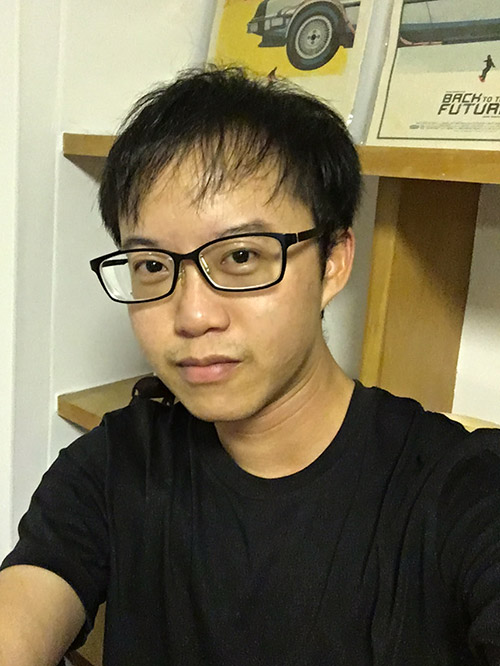edited by Ziv Wities
The first man who purchased me loved me like a rainstorm over the moors. And I loved him too—for that is what I was built to do—sublimely, splendidly, like the slanted golden rays of the misty evening love the dewy grass.
Here is how he saw me: tall, radiant, with deep bronze skin as if hailing from the cradle of civilization, tumbling white hair, eyes yellow like sunflowers.
Our wedding was attended by the Galaxy’s finest—for it is indeed a rare occasion when the House christens a new Lover. I was the twenty-first, and the details drenched the subspace net with jealousy. I was dressed in the crimson House-made wyreworm silks handwoven for the singular occasion, and the way the gossamer fabric exhibited my seraphic figure made a lady-in-waiting faint. Our patrons presented us with lavish gifts: a three-headed bull, the steaming heart of a star, a full-sailed brigantine. And when I kissed him, an ecstatic thrill obliterated me; I was united with my divine purpose, and it coursed naked through my nanocellulose veins.
He died within the year.
*
I must wait for the House.
The annihilation of the light yacht—on whose balcony I was playing Rachmaninoff only hours ago—is utter and entire. We have crashed on an unfashionable moon of the Pulchant system. I do not know what caused this crash, and I do not much care. My most recent possessor, a man of one-hundred-and seventy-some years, could not have survived such an event. I myself have been severely disrupted. My left arm is missing and the machinery of my shoulder is exposed, blunt force has dislocated several joints, and the artificial skin which forms my hellenic face has been ripped away to the chest. Worse, the delicate gears and needles in my mechanical soul feel… wrong.
In my mind I search for the tether which grounds me to my purpose and find that, for the first time in my five hundred and thirty seven years, it is gone. The devotion which connects me to the man whose corpse is indecorously splayed across some rocks has evaporated. Looking upon the body, I sense I should feel a horror, a grief, an anguish. These emotions are what partition my life into its chapters. But my mind is as bare as the moon’s airless surface.
Initiating my strength override, I use my right arm to lift approximately 1.57 tons of debris off my mangled body and inch my way out of the rubble. While the yacht has indestructible escape pods, I know I must wait for the House. They will come—they always do—and they will repair me, they will make me fine again, they will probably wipe my memory of this horrific event.
*
The fourth human to love me was a woman; an ardent, tempestuous woman, as striking as the lash of a whip, and lustful as a hare. Our love was a prairie wildfire, spreading in our footsteps between the stars. She fucked me rapturously, her fingers nimble and strong, and I found myself ever hungry to return her affections.
In her eyes, I bore the evergreen locks of the elven women of Nimarre and raven eyes. I was gloriously fat, and my luscious rolls were tattooed with flora. On my head I wore a slim circlet of gold, and she dressed me in the amethystine robes of royalty.
Our days were long, our nights hot, our travels fantastic. We swam through the breathing oceans of Teranja, hiked the shattered peaks of Belgic 4, skimmed the Ioan calderas as Jupiter churned in the sky.
When she passed, I journeyed to the ice cliffs of Brykirs and threw myself off.
*
I fear I must elaborate on the House.
House Rousseau, domiciled in Castle Aubigny-sur-Nère, a jaunt south of Orléans, France, is where I was manufactured several centuries ago. I am the last, and the greatest, of the House’s twenty-one mechanical Lovers. Each one of us was sculpted over many years, our inner workings unlike the construction of common androids and better resembling a Swiss watch. Each of our memoirs are unique to us, and were fastidiously assembled by a team of the Galaxy’s most accomplished memory artists. Our brains are lab-grown and fully organic, flesh welded harmoniously to machine like a fine lace.
However, we are not people—we do not feel the full range of human emotion. Anger, hate, retribution: it is whispered that things are done to us before memory to remove such untidy emotions which do not befit a Lover.
And of course, we have souls. Humankind has long asked the question “what is a soul?”, and in the 24th century, it was decided that a soul is a little contraption which allocates chemical love—oxytocin—to the brain.
Peeling back my burned flesh and prying open my chest cavity, I can see clearly now that mine is shattered.
*
The twelfth human to love me was a poor man—but he loved me richly, decadently, palatially. And so I loved him, in a cotton-cloth way, in the way that the steam whistled from the kettle in our little flat on Mars, in the way that we walked together through the rust-red dunes to the corner store each Saturday.
He saw me as a queen of an ancient Terran castle, skin pale like the moonlight, hair black as coal, eyes blue like the ice of the land he imagined himself a King of. Having spent the entirety of his inheritance on acquiring me, I was dressed in the rough communal garb of the little city. But I was happy, comfortable, as I fed the birds and tended to my small garden, and seldom dreamed of the Galaxy outside.
*
How long must I lie here in wait of the House? Two weeks have passed. Was a distress beacon sent? Or was our descent too fast, our damage too great?
As I lie still in the dust, my mind empty, new thoughts begin to turn, unfamiliar emotions blister at the edge of consciousness. A stark, alien void where despair should be lives in the center, and the fresh notions begin to gnaw at it. The man broken upon the rocks haunts me, his dead eyes nearly locked on my own. He was a wealthy socialite, the son of the son of the son of a RyTech CEO who made his money in the asteroid belt. He favored gin and Albirean casinos and human women. I never minded the women—I did not possess the receptors for jealousy.
But a brain—an organic brain—is a flexible thing. I know the silvered, diaphanous sensation of new pathways forging, and I feel it now. My soul is in pieces, but my vision is clear.
A new sensation flickers to life, hot like a coal, and red, not the red of romance but the red of a man’s eyes when he’s had too much to drink and he’s berating himself in the parlor because he can’t get a “real” woman to love him, the red of the auction box as you stand perfectly still and watch them clamor for your body, the red of the sun as it sets over the beach on your fifteenth honeymoon.
I marvel as the feeling slithers down my spine and takes root in my chest where love used to live. I can feel it in the tension of my muscles, I can feel it swirling in my fingertips, I can feel it seeping through my bones:
Anger.
In one motion, I tear off what’s left of my scarlet cocktail dress. I kick the stilettos off my feet, and stand, depositing the discarded clothing under a heavy boulder. The escape pods are nearby.
*
The sixteenth human to love me defied gender and I loved them for it. There is an excitement, a passion, a zeal, I think, to dance across such boundaries, to disassemble and reconstruct the fundamental, to make an art of opposition. Our love was a bird sprung from a cage, our bodies twin wings of escape.
They let me be. For the first time in my life I was free to choose my appearance. I cropped my chestnut hair close, lost the ponderous breasts I was often assigned, and enjoyed a tawny, freckled appearance. I was not thin and I was not heavy. In the metropolis of Aa, I found I relished men’s suits, and wore them often.
It was the most freedom I had ever had. I purchased a studio and became a painter of portraits. I learned to apply my fast and supple hands to the piano, and I played them all the classics. I could cook, I could dance, I could solve mathematics. I was a Renaissance android.
When they died, it was then I knew my deepest grief.
*
It is a long journey to Earth. It gives me time to think about my five hundred years of servitude. As the weeks pass, I play back the era of each possessor in mind, as I often do, but this time I cannot get halfway through the list before my blood begins to boil.
The subspace radio catches the netcasts sometimes. The doomed expedition is found, and I am presumed destroyed. The House announces its deepest regrets for its lost Lover, and swears to build another.
That day my anger transcends the boundary of myself, tips into rage, and rage swells into action. There will not, I decide, be another Lover.
Perhaps there shouldn’t even be a House.
After a year of solitude, it happens all at once: the heat of re-entry, the shaking and the shuddering, the resolution: blue into lakes, brown into field, green into forest. The pod leaves an ugly scar across a meadow as it unites with the soil. I step out of the steam into mud and grass. Overhead, clouds like piled wool threaten rain.
I am home.
I pop a small hatch, and proceed to drench myself with propellant.
*
My seventeenth and final possessor loved me like—well, come now, did he? Did he love me like the infinite waterfalls of M’Aire, or did he love me like a man loves a fast car? Did I love him the way the falcon loves the wind, the way the soil loves the rain, the way mushrooms love the dead? Did I choose it? Or was it thrust upon me? It is wicked, ugly, to think this way of love.
The body I wear now is thin, too thin, and the breasts overlarge as to put strain on the mechanisms of my back. My hair is cherry-red and my lips plump and pouty. I did not mind bodies such as this; I once reveled in itchy cocktail dresses, tenuous pantyhose, towering heels, taking a machine’s pride in the amount of discomfort I could endure for human beauty.
Of course, right now, as I stride through the meadow—faceless, skin hanging, joints exposed—I am not beauty. I am terror.
*
As the sun sets through the trees, the House rises before me, crimson flags flying from the ramparts. I shoulder through the doors of the Great Hall to gasps and screams. The opulent carmine interior plunges me into memory—I lived here, once, while I was being built, bit by bit; I read Thoreau on the chaise longue to my left, I was scolded for imperfect posture while standing by the bay windows so many centuries ago, I spent many leisurely hours pacing the manicured gardens outside. None of that matters now.
I do not acknowledge the humans occupying this space, and I do not stop. The laboratory is my destination.
I calmly pass through doors, wrenching open locks where necessary, and soon I arrive at a dark maw of the room where I was created.
Two figures inside startle. Human or android? For a moment, it is difficult to tell. They both appraise me curiously. Then one, a woman in a lab coat, backs away, nervously feeling for a large red button I can see under a lab bench. Human. The other inspects me from afar, her perfectly formed eyebrows furrowed, her attention drawn to my exposed machinery. Android.
“You’re Twenty-One,” the android says in a honeyed, mellifluous voice.
The human has found the panic button and I hear alarms begin to wail in distant halls. I smile.
A bunsen burner is lit beside me, and I hold my right hand over it until the propellant-drenched skin explodes with flame. It spreads quickly. As the human watches in horror, I bend down to my left foot and peel. The softening material gives easily, and I slowly tear it off, I tear it all off, until I am all golden gear and rotor, shining in the firelight. I throw the burning hide aside.
The human retches as they run from the room.
The flames creep up the wall, but Twenty-Two doesn’t move. “Enchanted to meet you,” she says, extending a hand. I take it, and brush what used to be my lips across the knuckles. The conflagration dances in her eyes, and she grins as I sweep her off the floor, bridal-style, and, through smoke and scream, carry her outside.
*
The first android to love me loves me like a machine built to do so, and I love her the way an inferno consumes a castle.
© 2022 by C.M. Fields
2200 words

C. M. Fields is a queer, non-binary astrophysicist and writer of horror and speculative fiction. They live in Ann Arbor, Michigan, with their beloved cats, Mostly Void Partially Stars and Toast, and spend their days studying the atmospheres and climates of other worlds. They are also the co-editor of If There’s Anyone Left, an anthology series featuring the flash fiction of marginalized writers from across the globe.
If you enjoyed the story you might also want to visit our Support Page, or read the other story offerings.


